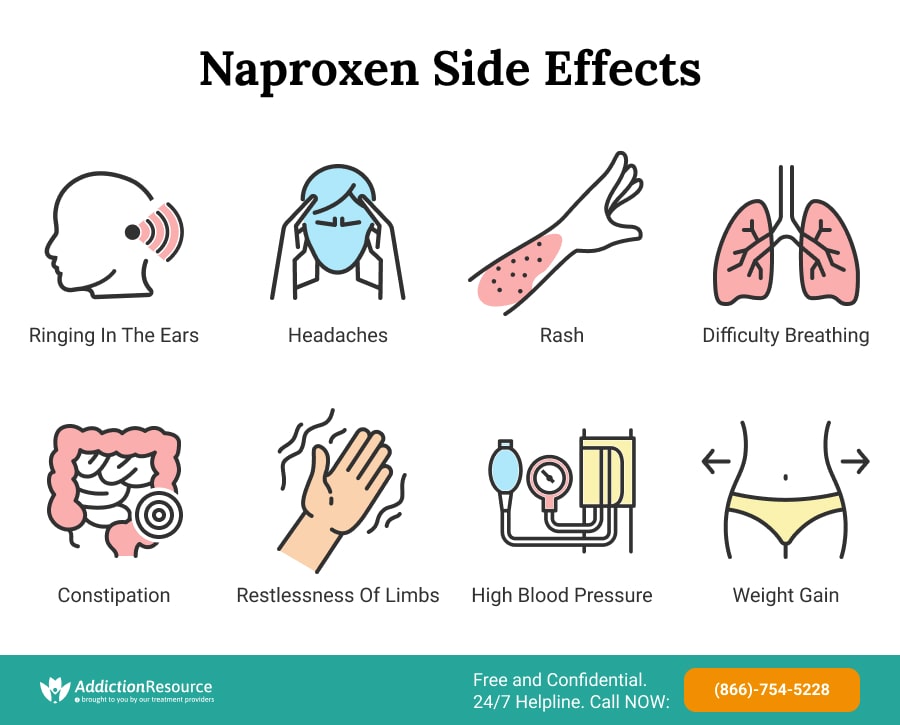
Naproxen is safe and a popular choice when it comes to pain management or treating such conditions as arthritis. It is classified as a non-steroidal anti-inflammatory drug (NSAID) and sold over-the-counter or by prescription.
Side effects of Naproxen may manifest immediately or develop with increasing potential risk over time and depending on the Naproxen sodium dosage used. Moreover, Naproxen warnings should always be taken into account, as they can worsen the side effects. Though common Aleve side effects are transient and light in nature, some users may experience more severe reactions and even overdose.
Table Of Contents:
Read further to know more information about Naproxen side effects, overdose symptoms, and use in pregnancy.
Short-Term Side Effects Of Naproxen
Commonly, not everyone who takes this drug experiences adverse reactions. However, it is not recommended to take Aleve with alcohol or on an empty stomach to minimize associated risks.
Following Are the Most Common Side Reactions:
- Ringing in the ears
- Headache or migraine
- Drowsiness
- Rashes
- Breathlessness or difficulty breathing
- Itching skin
- Swelling
- Indigestion
- Constipation
- Lightheadedness
- The restlessness of limbs
Since Naproxen causes drowsiness, it is better to avoid performing activities that require mental acuity and alertness to minimize the risk of getting injured.
If any of these side effects appears, talk to your doctor, who will be able to provide you with information about alternative treatment.
Long-Term Use Naproxen Side Effects
The long-term use of the drug affects the body and its organs. It is vital to be informed about all the risks and receive medical consultation before using the medication.
Blood Pressure
The study on differential blood pressure effects of different NSAIDs showed that Aleve causes hypertension in patients. There are two ways by which Naprosyn affects the renal system:
- increase of water retention
- slowed down salt elimination through the urine.
Both conditions increase a person’s risk of developing hypertension.
Weight Gain
The weight gain on Naproxen is although rare, but it is still possible. The reason for this is the fluid retention caused by the drug. The prolonged use may cause an increase in body mass by a few pounds. In case one experiences an abnormal increase in body mass, it is important to consult with the doctor to define the reason behind the abnormal weight gain.

Heart Disease
One of the potential Naproxen dangers is the risk of developing cardiovascular disease. NSAIDs, such as Naproxen or Ibuprofen, were found to increase a person’s risk for a heart attack or a stroke. At the same time, one study found that Aleve poses a lower risk for developing cardiovascular diseases versus other NSAIDs.
Bleeding
Another dangerous Napoxen side effect is bleeding. People who take anticoagulants and antiplatelet drugs intended to thin the blood to prevent blood clotting should not take Aleve. The concomitant use of these drugs elevates the possibility of such side effects as internal and external bleeding. Experts warn that taking NSAIDs and blood thinners together may adversely affect the body’s mechanism for forming blood clots. Moreover, abuse of high amounts of the medication may cause intestinal bleeding, most commonly in the digestive tract.
Delaying the Menstrual Period
One of the possible Naproxen side effects is delaying the menstrual period. Naprosyn relieves pain by decreasing the amount of prostaglandin to deliver an anti-inflammatory effect. Prostaglandins trigger shedding of the uterine lining. At lower levels, they are also less available to trigger the start of a new menstrual cycle.
Intentional use of medicine for delaying the period is harmful to one’s health. It may cause undesired effects and negatively affect health.
Taking prescription levels of Naprosyn, for this reason, is discouraged because it increases a person’s risk for Naproxen sodium overdose. Besides, there are no guarantees that the menstrual cycle will be delayed, and, if it does, it will likely be delayed for just 2 days max.
Naproxen Allergy
It is also possible to develop an allergic reaction to Naproxen. It is Manifested With One or More Of the Following Symptoms:
- Rashes
- Itchy skin
- Swelling
- Wheezing
- Breathlessness
When allergic reactions show – immediately stop taking the drug and see a doctor, make sure to discuss alternatives to Naproxen with the healthcare provider.
Naproxen Warnings
Concerning Aleve warnings and contraindications, any person living with specific conditions must seek approval from a qualified physician before taking any Aleve dose. Some health conditions can severely worsen Naproxen’s risks.
The List Of Naproxen Warnings and Contraindications that Limit the Drug’s Use Include:
- History of an allergic reaction to NSAIDs
- History of intestinal or stomach ulcers or bleeding
- History of heart attack or stroke
- Anemia
- Clotting disorder
- Chronic heart failure
- Systemic mastocytosis
- Aspirin intolerance or allergies
- Advanced renal failure
- High blood pressure
- Alcoholism
- Fluid retention
- Asthma
- Stomach ulcer
- Diabetes
- Intestinal bleeding
- Blood vessel obstruction
- Pregnancy
- Post-coronary bypass surgery
- Post-gastric bypass surgery
- Liver failure
- Salicylates allergies
Can You Take Aleve While Pregnant?
In general, the use of painkillers during pregnancy is a usual thing since future mothers experience painful sensations from time to time. At the same time, one out of 33 babies is born with one or more congenital defects. One of the factors that can significantly increase this risk is when the mother of the child is dosing on a particular type of medication that interacts negatively with pregnancy.

Before using an NSAID (a non-steroidal anti-inflammatory drug) like Naproxen during pregnancy, it is important to be properly informed about the effects of such drugs on the pregnancy at different stages.
For starters, Naproxen is unlikely to harm a baby in the womb if the pregnancy is still under 30 weeks. This means that one can safely use Naproxen during early pregnancy (within the first and second trimesters of pregnancy) and a couple of weeks after that. However, this does not suggest that one can take Naproxen sodium while pregnant at those stages without informing the doctor first. One may be suffering from a Naproxen allergy or some other dangerous health conditions that negatively interact with the drug, and only a health care provider would know the best way to deal with this. If Naproxen is used in the third trimester of pregnancy (especially after thirty weeks), one risks the following side effects:
Premature Closure Of the Ductus Arteriosus
During pregnancy, a blood vessel in the baby (called the ductus arteriosus) needs to remain open to receive oxygen and nutrients from the mother. This vessel normally closes after birth. In situations where it closes early, the condition is called a premature closure of the ductus arteriosus. If premature closure occurs, there is a chance of high blood pressure in the baby’s lungs.
Persistent Pulmonary Hypertension Of the Newborn (PPHN)
PPHN refers to a situation where the lungs of the newborn baby are not developed properly enough to help it breathe normally outside the womb. It can be caused by the misuse of Naprosyn during pregnancy. It has been linked with the aforementioned side effect from premature closure of the ductus arteriosus. PPHN is a rare condition, but when it occurs, it is usually severe.
Additionally, using NSAIDs such as Naproxen during the third trimester of pregnancy can lead to low levels of amniotic fluids in the sac around the baby (a condition known as Oligohydramnios) or slow down labor.
Miscarriage
Some studies have suggested that regular use of NSAIDs such as Aleve during pregnancy may increase the chances of a miscarriage. NSAIDs reduce prostaglandins in the body, and if they are used regularly over a long period of time, this prostaglandin reduction can cause a miscarriage. If the pregnant individual has only sparsely used Aleve during early pregnancy, there should be nothing to worry about, but a health care provider’s attention and advice should still be sought.
Safe Use of Aleve While Breastfeeding
There is limited information about the interactions between Naproxen and breastfeeding. Some studies show that Aleve is unlikely to negatively affect the baby when taken in small amounts for a short period of time. However, even though Naproxen only enters breast milk in small amounts, its relatively long half-life makes it potentially more dangerous for the baby’s health than other NSAIDs. This is because long-term use of the drug with a long half-life, such as Aleve during breastfeeding, may cause compounds from the medicine to transfer into the baby’s body and collect there. Hence, it is more advisable to use alternatives such as Ibuprofen with a shorter half-life.

To minimize side effects from taking Aleve when breastfeeding, it is advisable to take the pills immediately after breastfeeding the baby to reduce concentration levels in the body before the next breastfeeding session.
Naproxen Overdose: Can One OD On Aleve?
Overdosing on Naproxen is not only detrimental to health but also potentially dangerous to one’s life. Individuals may overdose on Aleve either intentionally or accidentally. Despite its therapeutic benefits, severe Naproxen overdose may cause permanent and irreversible renal and liver damage and can be fatal.

It is vital to practice caution during the course of treatment. Disregard of safety rules leads to accidental overdoses.
Overdose Amount
The typical oral dose includes Naproxen 550 mg twice daily. Taking anything more than that can lead to Naproxen overdose . However, the overdose amount for Aleve varies from one individual to another, depending upon age, body mass, and pre-existing health condition. There is a registered case of a person overdosing on Naprosyn after taking approximately 320 tablets of the drug.
Signs and Symptoms of Naprosyn Overdose
The Following Are the Clear Signs Of Aleve Overdose:
- Increased urination
- Seizures
- Intense sleepiness
- Altered mental status
- Passing out
- Shortness of breath
- Blurred vision
- Severe headache
- Heartburn
- Stomach pain
- Vomiting
- Rash
Naproxen OD Response
Management of acute Naprosyn overdose is predominantly supportive and symptomatic. However, there are things one can do in case of an overdose to avoid consequences.
First Aid Measures Include:
- Call 911 or the poison control center (1-800-222-1222 toll-free in the US) right away for further instructions
- Provide information about a person’s location and wait for the emergency crew to arrive
- Ensure that the airways are protected
- Confirm breathing and presence of a pulse
- Follow the individual to the healthcare facility
- Always try to take the overdosed medicine along to the ER
Avoiding Risks While Using Naproxen
When Naproxen causes a headache, which it is intended to relieve, and triggers other adverse outcomes, ask about alternatives. Naproxen side effects are not unusual, and, like any other drug, it can cause adverse outcomes too. One must be aware of Naproxen brand names so that it doesn’t cause confusion when a doctor prescribes a new medication.
One must be careful when using Aleve during pregnancy or while breastfeeding. It is only safe to take Aleve during breastfeeding if the doctor prescribes.
People who develop a dependence or addiction to Aleve should not attempt to withdraw from the drug without proper medical attention. A rehab facility is the initial step in recovery from the addiction and overcoming the withdrawal symptoms. The specialized addiction treatment programs aim to resolve the initial cause of the addiction and fortify one’s mental strength to prevent possible relapse.
Page Sources
- Frank Ruschitzka, Jeffrey S Borer, Henry Krum, Andreas J Flammer, Neville D Yeomans, Peter Libby, Thomas F Lüscher, Daniel H Solomon, M Elaine Husni, David Y Graham, Deborah A Davey, Lisa M Wisniewski, Venu Menon, Rana Fayyad, Bruce Beckerman, Dinu Iorga, A Michael Lincoff, Steven E Nissen, Differential blood pressure effects of ibuprofen, naproxen, and celecoxib in patients with arthritis. 2017. https://www.ncbi.nlm.nih.gov/pubmed/29020251
- Medline Plus Naproxen Informational Page https://medlineplus.gov/druginfo/meds/a681029.html
- Angiolillo, D. J., & Weisman, S. M. Clinical Pharmacology and Cardiovascular Safety of Naproxen. American journal of cardiovascular drugs : drugs, devices, and other interventions, 2017. https://www.ncbi.nlm.nih.gov/pmc/articles/PMC5340840/
- Genetic Alliance; The New York-Mid-Atlantic Consortium for Genetic and Newborn Screening Services. Understanding Genetics: A New York, Mid-Atlantic Guide for Patients and Health Professionals. Washington (DC): Genetic Alliance; 2009. https://www.ncbi.nlm.nih.gov/books/NBK115547/
- Enzensberger, C., Wienhard, J., Weichert, J., Kawecki, A., Degenhardt, J., Vogel, M. and Axt-Fliedner, R. , Idiopathic Constriction of the Fetal Ductus Arteriosus. Journal of Ultrasound in Medicine. 2012. https://www.ncbi.nlm.nih.gov/pubmed/22837295
- Van Marter, L. J., Hernandez-Diaz, S., Werler, M. M., Louik, C., & Mitchell, A. A. Nonsteroidal anti-inflammatory drugs in late pregnancy and persistent pulmonary hypertension of the newborn. Pediatrics. 2013. https://www.ncbi.nlm.nih.gov/pmc/articles/PMC3529942/
- Bénédicte Lelièvre Isabelle Drouillard Chloé Thill Gaël Le Roux Chloé Bruneau Julien Mahé Marie Deguigne David Boels. Severe poisoning with naproxen causing coagulopathy. Nordic Pharmacological Society. 2019. https://www.ncbi.nlm.nih.gov/pubmed/31742906
- Al-Abri, S. A., Anderson, I. B., Pedram, F., Colby, J. M., & Olson, K. R. Massive naproxen overdose with serial serum levels. Journal of medical toxicology : official journal of the American College of Medical Toxicology. 2015. https://www.ncbi.nlm.nih.gov/pmc/articles/PMC4371030/


 Reviewed by:
Reviewed by:  Written by:
Written by: 


 FindTreatment.gov
FindTreatment.gov